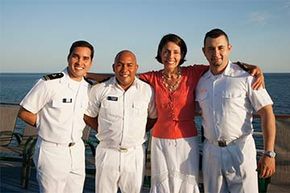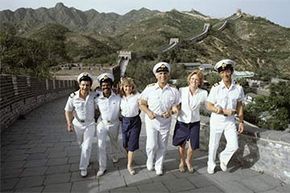Who hasn't gone on a vacation to a tropical island or a cozy winter ski town and thought "hey, wouldn't that be cool if I lived here the whole year around?" Like paying too much to rent a snowboard or developing a lobsteresque sunburn across the small part of your back that you couldn't reach with your own hand, dreaming up a full-time life of leisure is a central part of many folks' vacations. The trouble, of course, comes when reality sets in: Most people need a job to live. That's the kind of thing that can really harsh your chill on the tropical island. Unless, that is, you find a gig that pays you to be a part of other people's vacations. Like, maybe on a cruise ship?
It was all the way back in 1977 that television romanticized the cruise ship worker life with "The Love Boat," a long-running series about a good-times-focused ship crew and the romantic adventures of its guests [source: TV.com]. If you watched the show, you'd be hard-pressed to find many scenes in which Captain Stubing, Isaac the bartender and Julie the cruise director actually did any work. They were simply too busy with hijinks and tomfoolery to worry about pedestrian affairs like running a passenger boat.
Advertisement
In real life, working aboard a cruise ship isn't all lounge chairs, frozen cocktails and limbo lines. It's hard work that often requires long hours and the ability to live with your colleagues in close quarters. Perhaps that's why some love it: Cruise staff play a vital role, not only in keeping the vessel running, but also in helping guests make the most of their time at sea. Cruise workers also don't have to consider some of the petty concerns that come with a land-loving, cubicle-dwelling career, like commuter traffic, conference calls and printer jams.
So, how do you get a job on a cruise ship?
Advertisement




